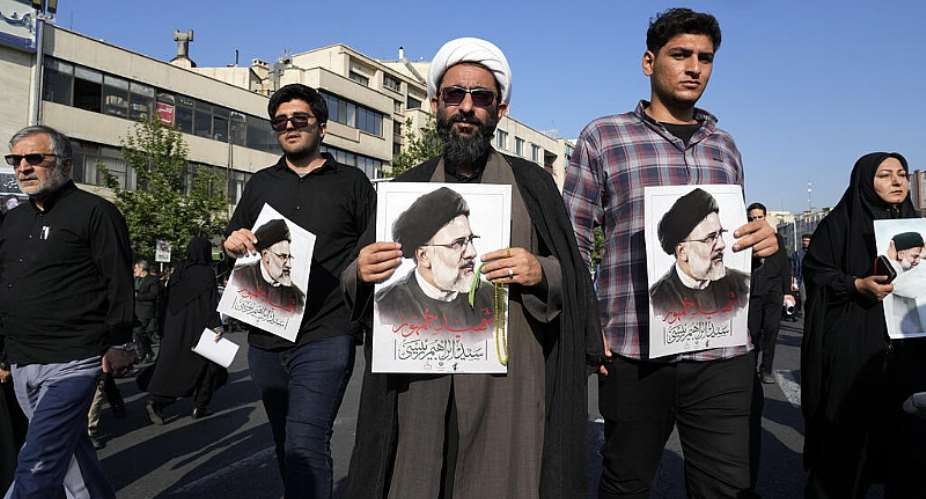Iranian president Ebrahim Raisi was laid to rest on Thursday, concluding days of funeral rites attended by thousands of mourners after his death in a helicopter crash last week. Experts say the tragedy may well increase tensions between Iran and Turkey, both vying for influence in the Middle East.
Hundreds of thousands marched in Raisi's home town Mashhad to bid farewell ahead of his burial following processions in the cities of Tabriz, Qom, Tehran and Birjand.
The 63-year-old died on Sunday alongside his Foreign Minister Hossein Amirabdollahian and six others after their helicopter went down in the country's mountainous northwest while returning from a dam inauguration on the border with Azerbaijan.
A huge search and rescue operation was launched, involving help from the European Union, Russia and Turkey before the crash site was located early on Monday.
The Iranian military said that a drone dispatched by Turkey had failed to locate the crash site "despite having night-vison equipment".
"Finally, in the early hours of Monday morning, the exact spot of the helicopter crash was discovered by the ground rescue forces and Iranian drones of the armed forces," the military said in a statement carried by the official IRNA news agency.
Meanwhile, on Thursday Iran's army said it has so far found no evidence of criminal activity related to the crash.
Simmering tensions
The high profile deaths come as rivalry continues to intensify between Iran and Turkey.
"For Turkey, the future of South Caucasia, Iraq and Syria are critical for its national security. And here in these areas of Turkey, all face Iranian opposition against Turkey's interests," explained Bilgehan Alagoz, a professor of international relations at Istanbul's Marmara University.
For example, the Turkish military is poised to launch a major offensive in Iraq and Syria against the bases of the Kurdish rebel group PKK, which is fighting the Turkish state.
Ankara has repeatedly criticised Tehran for failing to support its efforts, while Iran is concerned about Turkey encroaching in areas it considers to be in its sphere of influence.
The death of Raisi has brought to the fore bitter memories of the killing by the United States four years ago of Qasim Soleimani, the veteran head of the international operations of Iran's Islamic Revolutionary Guards Corp.
"These two important personalities had been increasing Iranian influence in the Middle East very strongly," observed Professor of International Relations Huseyin Bagci at Ankara's Middle East Technical University.
Bagci says Turkey's diplomatic advantage will no doubt be stronger as Iran heads into presidential elections on 28 June.
"I don't know if the new foreign minister and President will somehow get the same level of this influence because they will be mostly inexperienced people," he says.
Internal fight for power
Bagci suggests that a real internal fight for power will be problematic for the country because "Iranian society is much more dynamic and progressive than the regime.
"There is a partnership between the clerics and the military. But these two institutions are also fighting amongst each other."
However, if Iran's Revolutionary Guard increases its power, experts warn that it could also result in a more assertive use of Iranian proxies controlled by the IRGC in Iraq and Syria, which are often as odds with Turkish interests.
Alagoz says that the IRGC's view of the region is very problematic because the Iran proxies are a problem for the future of the Middle East.
"The overconfidence of the IRGC combined with political power will be a destabilising factor in the Middle East, and so Turkey will always be concerned by this issue."
With Ankara and Tehran competing for power from Syria and Iraq to Sudan, analysts say the outcome of Iran's transition of power could have significant implications across the region and for Turkish-Iranian relations.





 Zuma's party joins S.African opposition alliance
Zuma's party joins S.African opposition alliance
 'NDC thrives on propaganda and illiteracy' — Obiri Boahen
'NDC thrives on propaganda and illiteracy' — Obiri Boahen
 Lawyer Obiri Boahen drops bombshell against African Leaders
Lawyer Obiri Boahen drops bombshell against African Leaders
 V/R: Embrace peace to dispel violent tag on Muslims — Ketu South Chief Imam
V/R: Embrace peace to dispel violent tag on Muslims — Ketu South Chief Imam
 Effutu MCE urges Muslim youth to reject politicians who foment trouble
Effutu MCE urges Muslim youth to reject politicians who foment trouble
 Eid-ul-Adha: Strengthen your faith in Allah for peaceful elections — Northern Re...
Eid-ul-Adha: Strengthen your faith in Allah for peaceful elections — Northern Re...
 Eid-ul-Adha: Let’s all sacrifice for Ghana's progress—Bono Minister urge Ghanaia...
Eid-ul-Adha: Let’s all sacrifice for Ghana's progress—Bono Minister urge Ghanaia...
 Ellembelle Chief Imam urges EC to ensure level playing field for December electi...
Ellembelle Chief Imam urges EC to ensure level playing field for December electi...
 Tema Port receives largest container vessels named Kota Tema
Tema Port receives largest container vessels named Kota Tema
 Akufo-Addo preaches peace as Ghana marks Eid-ul-Adha
Akufo-Addo preaches peace as Ghana marks Eid-ul-Adha
